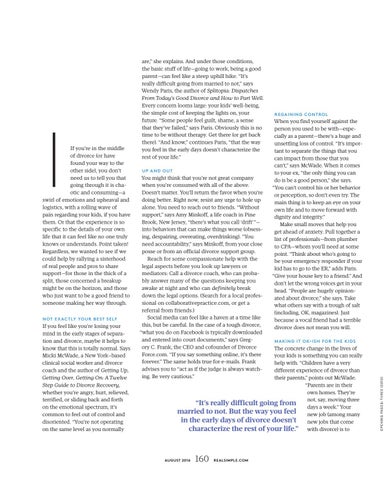N OT E X AC T LY YO U R B E ST S E L F
If you feel like you’re losing your mind in the early stages of separation and divorce, maybe it helps to know that this is totally normal. Says Micki McWade, a New York–based clinical social worker and divorce coach and the author of Getting Up, Getting Over, Getting On: A Twelve Step Guide to Divorce Recovery, whether you’re angry, hurt, relieved, terrified, or sliding back and forth on the emotional spectrum, it’s common to feel out of control and disoriented. “You’re not operating on the same level as you normally
UP AND OUT
You might think that you’re not great company when you’re consumed with all of the above. Doesn’t matter. You’ll return the favor when you’re doing better. Right now, resist any urge to hole up alone. You need to reach out to friends. “Without support,” says Amy Minkoff, a life coach in Pine Brook, New Jersey, “there’s what you call ‘drift’”— into behaviors that can make things worse (obsessing, despairing, overeating, overdrinking). “You need accountability,” says Minkoff, from your close posse or from an official divorce support group. Reach for some compassionate help with the legal aspects before you look up lawyers or mediators: Call a divorce coach, who can probably answer many of the questions keeping you awake at night and who can definitely break down the legal options. (Search for a local professional on collaborativepractice.com, or get a referral from friends.) Social media can feel like a haven at a time like this, but be careful. In the case of a tough divorce, “what you do on Facebook is typically downloaded and entered into court documents,” says Gregory C. Frank, the CEO and cofounder of Divorce Force.com. “If you say something online, it’s there forever.” The same holds true for e-mails. Frank advises you to “act as if the judge is always watching. Be very cautious.”
R EGA I N I N G C O N T RO L
When you find yourself against the person you used to be with—especially as a parent—there’s a huge and unsettling loss of control. “It’s important to separate the things that you can impact from those that you can’t,” says McWade. When it comes to your ex, “the only thing you can do is be a good person,” she says. “You can’t control his or her behavior or perception, so don’t even try. The main thing is to keep an eye on your own life and to move forward with dignity and integrity.” Make small moves that help you get ahead of anxiety. Pull together a list of professionals—from plumber to CPA—whom you’ll need at some point. “Think about who’s going to be your emergency responder if your kid has to go to the ER,” adds Paris. “Give your house key to a friend.” And don’t let the wrong voices get in your head. “People are hugely opinionated about divorce,” she says. Take what others say with a trough of salt (including, OK, magazines). Just because a vocal friend had a terrible divorce does not mean you will. M A K I N G I T O K- I S H F O R T H E K I D S
The concrete change in the lives of your kids is something you can really help with. “Children have a very different experience of divorce than their parents,” points out McWade. “Parents are in their own homes. They’re not, say, moving three “It’s really difficult going from days a week.” Your married to not. But the way you feel new job (among many in the early days of divorce doesn’t new jobs that come characterize the rest of your life.” with divorce) is to
AUGUST 2016
160
REALSIMPLE.COM
O P E N I N G PA G E S : T H R E E ( 2 0 1 3 )
I
If you’re in the middle of divorce (or have found your way to the other side), you don’t need us to tell you that going through it is chaotic and consuming—a swirl of emotions and upheaval and logistics, with a rolling wave of pain regarding your kids, if you have them. Or that the experience is so specific to the details of your own life that it can feel like no one truly knows or understands. Point taken! Regardless, we wanted to see if we could help by rallying a sisterhood of real people and pros to share support—for those in the thick of a split, those concerned a breakup might be on the horizon, and those who just want to be a good friend to someone making her way through.
are,” she explains. And under those conditions, the basic stuff of life—going to work, being a good parent—can feel like a steep uphill hike. “It’s really difficult going from married to not,” says Wendy Paris, the author of Splitopia: Dispatches From Today’s Good Divorce and How to Part Well. Every concern looms large: your kids’ well-being, the simple cost of keeping the lights on, your future. “Some people feel guilt, shame, a sense that they’ve failed,” says Paris. Obviously this is no time to be without therapy. Get there (or get back there). “And know,” continues Paris, “that the way you feel in the early days doesn’t characterize the rest of your life.”



















